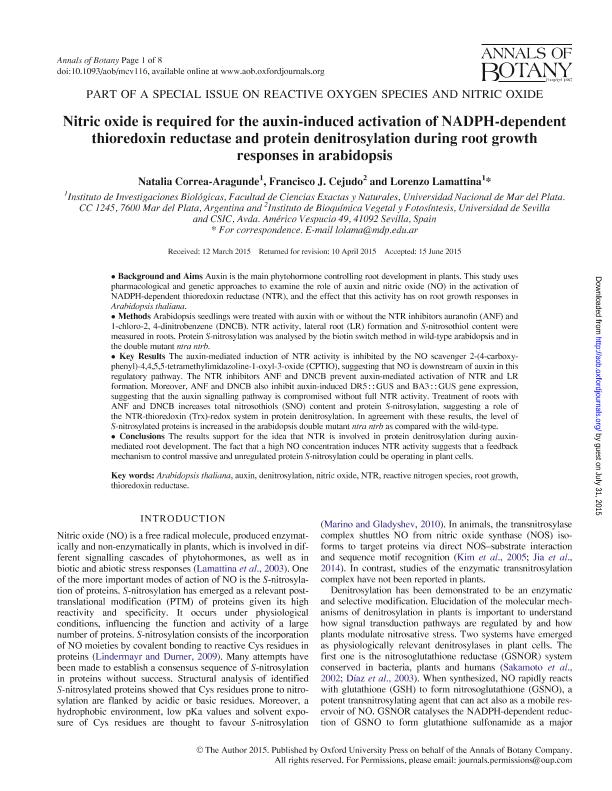Artículo
Nitric oxide is required for the auxin-induced activation of NADPH-dependent thioredoxin reductase and protein denitrosylation during root growth responses in arabidopsis
Fecha de publicación:
06/2015
Editorial:
Oxford University Press
Revista:
Annals of Botany
ISSN:
0305-7364
e-ISSN:
1095-8290
Idioma:
Inglés
Tipo de recurso:
Artículo publicado
Clasificación temática:
Resumen
Background and Aims: Auxin is the main phytohormone controlling root development in plants. This study uses pharmacological and genetic approaches to examine the role of auxin and nitric oxide (NO) in the activation of NADPH-dependent thioredoxin reductase (NTR), and the effect that this activity has on root growth responses in Arabidopsis thaliana. Methods: Arabidopsis seedlings were treated with auxin with or without the NTR inhibitors auranofin (ANF) and 1-chloro-2, 4-dinitrobenzene (DNCB). NTR activity, lateral root (LR) formation and S-nitrosothiol content were measured in roots. Protein S-nitrosylation was analysed by the biotin switch method in wild-type arabidopsis and in the double mutant ntra ntrb. Key Results: The auxin-mediated induction of NTR activity is inhibited by the NO scavenger 2-(4-carboxyphenyl)-4,4,5,5-tetramethylimidazoline-1-oxyl-3-oxide (CPTIO), suggesting that NO is downstream of auxin in this regulatory pathway. The NTR inhibitors ANF and DNCB prevent auxin-mediated activation of NTR and LR formation. Moreover, ANF and DNCB also inhibit auxin-induced DR5 : : GUS and BA3 : : GUS gene expression, suggesting that the auxin signalling pathway is compromised without full NTR activity. Treatment of roots with ANF and DNCB increases total nitrosothiols (SNO) content and protein S-nitrosylation, suggesting a role of the NTR-thioredoxin (Trx)-redox system in protein denitrosylation. In agreement with these results, the level of S-nitrosylated proteins is increased in the arabidopsis double mutant ntra ntrb as compared with the wild-type. Conclusions: The results support for the idea that NTR is involved in protein denitrosylation during auxin-mediated root development. The fact that a high NO concentration induces NTR activity suggests that a feedback mechanism to control massive and unregulated protein S-nitrosylation could be operating in plant cells.
Archivos asociados
Licencia
Identificadores
Colecciones
Articulos(IIB)
Articulos de INSTITUTO DE INVESTIGACIONES BIOLOGICAS
Articulos de INSTITUTO DE INVESTIGACIONES BIOLOGICAS
Citación
Correa Aragunde, Maria Natalia; Cejudo, Francisco J.; Lamattina, Lorenzo; Nitric oxide is required for the auxin-induced activation of NADPH-dependent thioredoxin reductase and protein denitrosylation during root growth responses in arabidopsis; Oxford University Press; Annals of Botany; 116; 4; 6-2015; 695-702
Compartir
Altmétricas




